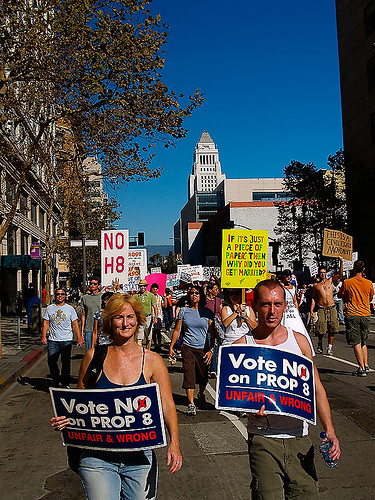Prop. 8 Ruling A Victory For All
James Madison is smiling on California today. When he wrote Federalist 10 in 1787, he probably didn’t realize that the essential drama of government he described would play out centuries later across the continent in a place barely known to Europeans at the time.
Wednesday’s ruling on Proposition 8 isn’t just a victory for the gay community, it’s a victory for anyone who treasures their individual liberties. When Perry v. Schwarzenegger inevitably reaches the Supreme Court, this nation’s highest judicial body will have the chance to finally affirm that the many lack the standing to revoke the rights of the few.
Despite Proposition 8 winning a clear majority of voters in 2008, and despite the fact that most Californians favor a constitutional ban on gay marriage, Judge Vaughn Walker was right to overturn the will of the California voters. By doing so, Walker reaffirmed a major principle on which the United States was founded—namely that some rights held by the people are not subject to popular sovereignty.

Madison described this dilemma well.
“A common passion or interest will, in almost every case, be felt by a majority of the whole…and there is nothing to check the inducements to sacrifice the weaker party or an obnoxious individual,” he wrote. “Hence it is that such democracies have ever been spectacles of turbulence and contention; have ever been found incompatible with personal security or the rights of property; and have in general been as short in their lives as they have been violent in their deaths.”
Madison and other Federalists saw the answer to the will of the majority trampling the rights of the minority in the formation of a Constitutional Republic with a system of representative democracy. The Anti-Federalists, such as Patrick Henry and George Mason, were concerned with the rise of a hegemonic federal government, refused to ratify the original constitution without a Bill of Rights enumerating essential rights retained by the people. Following the Civil War and the passage of the 14th Amendment, the Bill of Rights was extended to include protection against abuses not only by the federal government, but by those of the states. This evolution of our constitution set the stage for the battle over Proposition 8 today.
It’s a sad fact of history that the gay and lesbian community has served as the unfortunate example of how majority rule can go wrong. Two major cases—Lawrence v. Texas and Romer v. Evans—had to be litigated all the way to the level of the Supreme Court to affirm the right of people of the same gender to engage in consensual sex and the right of homosexuals to seek special protection against discrimination. The latter case is especially relevant to Californians as the law was passed by Colorado voters through a popular initiative amending the state’s constitution. In overruling the initiative, Justice Kennedy wrote that the amendment’s “sheer breadth is so discontinuous with the reasons offered for it that the amendment seems inexplicable by anything but animus toward the class that it affects...”
Overturning Proposition 8 did nothing to empower homosexuals at the expense of others. It does not require heterosexuals to change anything about their lives or their beliefs, nor does it require them to provide any sort of compensation towards homosexual couples. Rather, overturning Proposition 8 simply allows gay men and women the opportunity to enter into the same secular contract that heterosexuals have entered into for more than 150 years since the end of common-law marriage. If some churches, mosques or synagogues don’t wish to issue licenses or perform ceremonies for homosexual couples, they’re still entirely within their rights to do so—as they should be.
It’s my sincere hope that Perry v. Schwarzenegger enter into the legal cannon among such cases as Loving v. Virginia, D.C. v. Heller and Tinker v. Des Moines Independent Community School District as a water-shed case establishing that individuals still retain constitutionally protected rights no matter what the prevailing moral wind and no matter what the supposed interest of the state is in restricting it.
At its heart, this case is about the right to equal protection under the law, no matter if the rest of the world finds your behavior objectionable, sacrilegious or morally reprehensible. It’s a founding principle of the United States of America and part of what’s made our country stand out from all the other failed democracies buried in the graveyard of history.
When the wedding bells start tolling again in California, they’ll toll not just for the thousands of people who no longer find themselves to be second-class citizens, they’ll toll for every American who believes that the rights afforded by the Constitution are inalienable and not something that can be taken away at the ballot box or by the stroke of some lawmaker’s pen.
Reach columnist Stan Oklobdzija here.



